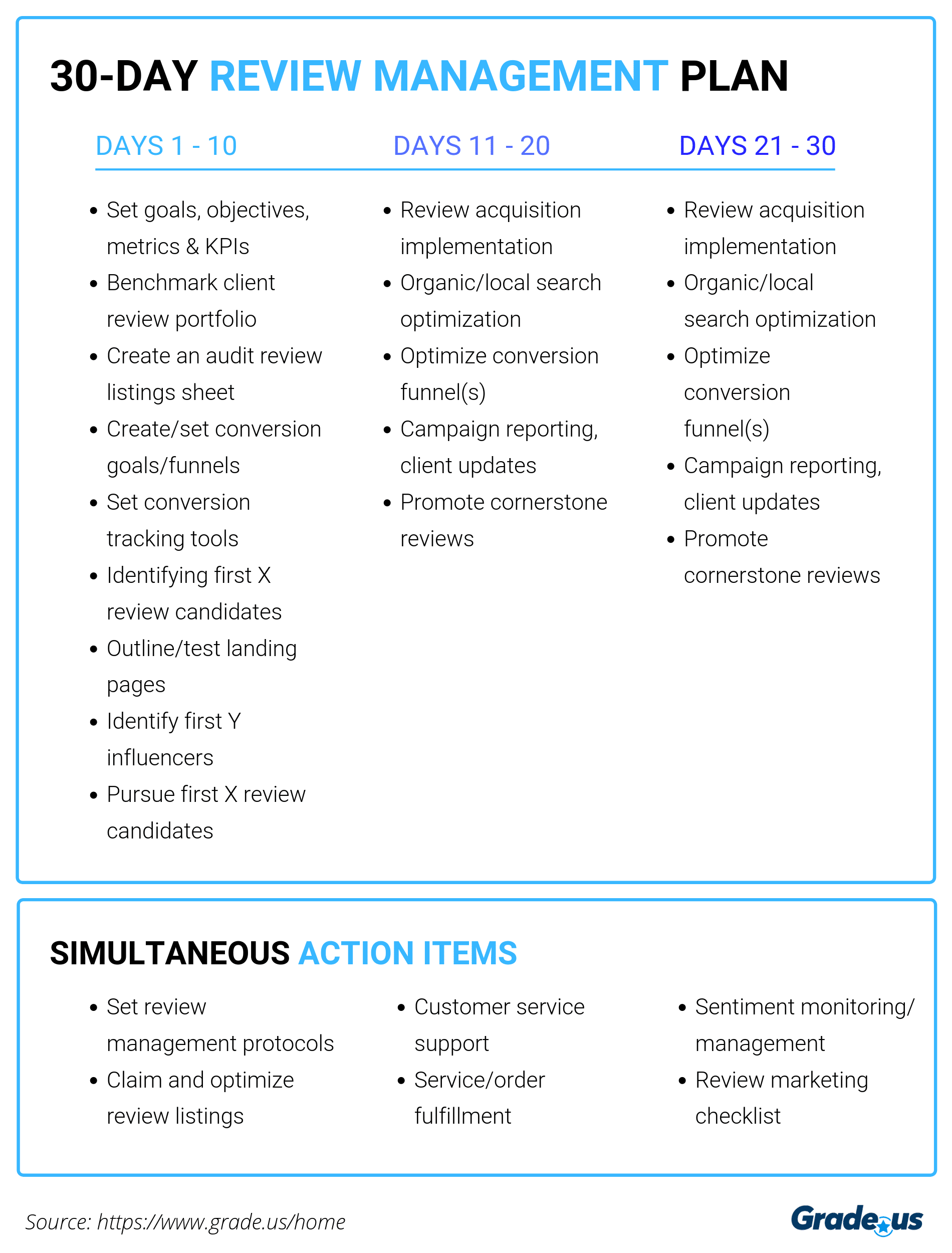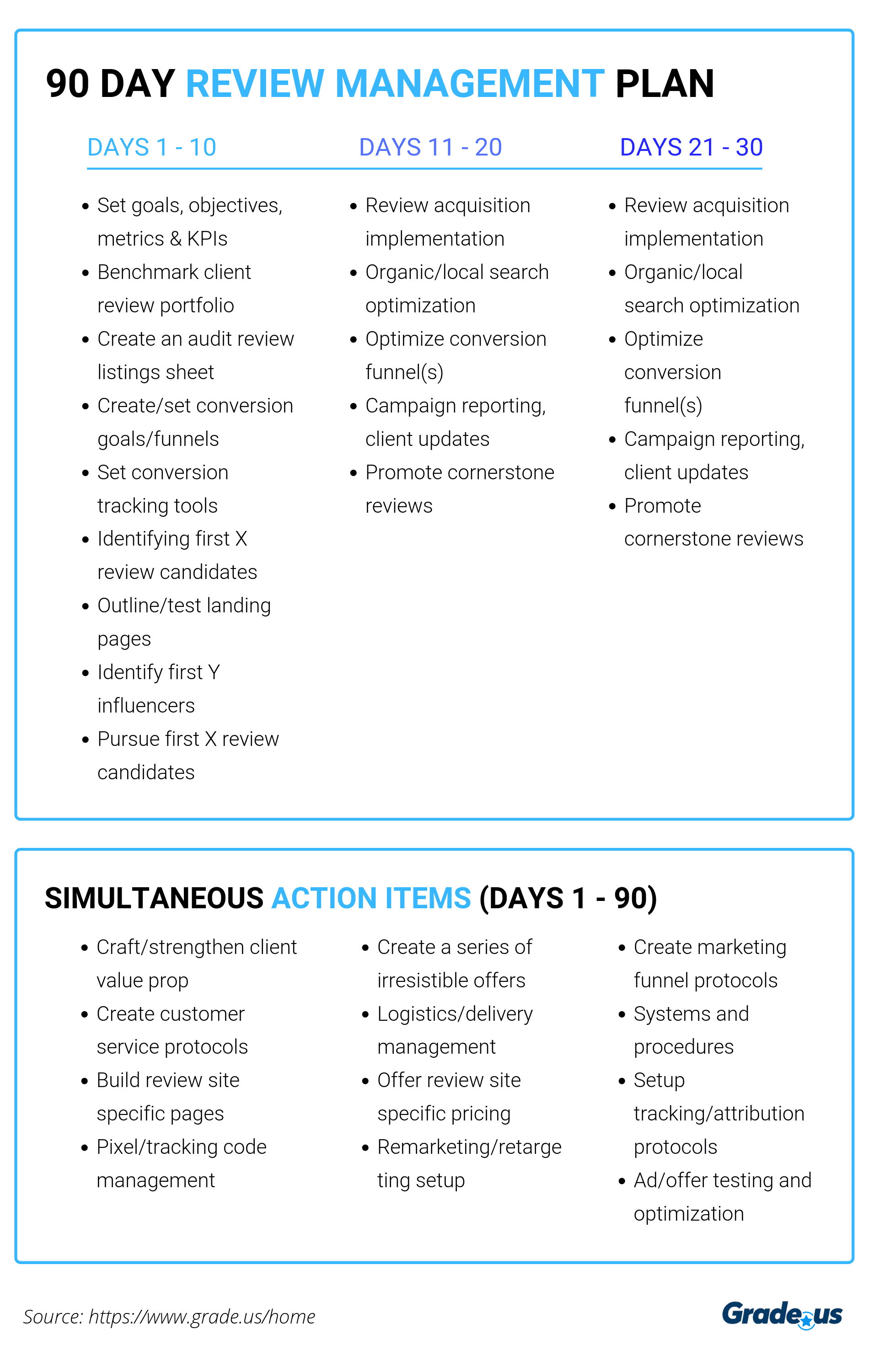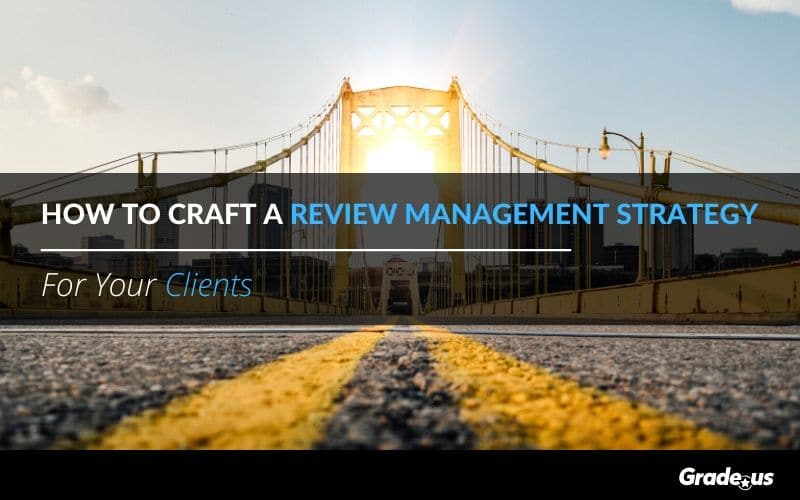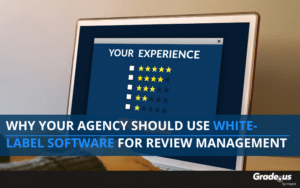Updated: 3/9/2020
Your clients understand the value of online reviews. That’s one reason why it’s critical for your agency to deliver a review management strategy that will elevate their reputation and digital marketing. They may not be able to define things as clearly if you ask them about their review strategy, but they know it’s essential.
When you ask them to articulate what they need to do:
“All you have to do is get reviews, and your revenues will go up. Positive reviews boost our revenues, and negative reviews obliterate our revenues.”
Right?
Not so much, no.
Your clients need you to build a structurally sound review management strategy if they’re going have a chance at building a strong, revenue-generating campaign. Today we’ll show you the ins and outs of doing just that.
Table of Contents
Your goal-driven review management strategy
Goal setting should be part of the onboarding process for new clients. Your review management campaigns should be focused on one primary goal. Each of these should be tied directly to your client’s business goals — traffic, leads, customers, sales, and revenue.
You’ll need goals for:
1. Aggregate Star Ratings
2. Review Recency
3. Review Site Diversity
Each of these goals impacts how your client is positioned in Google’s search results, the psychological impact their reviews have on customer perception and the social proof that affects their purchasing decisions.
Aggregate Star Ratings
According to BrightLocal’s 2019 Survey:
“Only 53 percent of consumers would use a business that has less than 4 stars – so this should be the bare minimum you aim for.”
A three-star aggregate rating was the minimum in 2018, showing that customers have raised their expectations dramatically.
If your client’s aggregate star rating is below 4 stars, there’s a significant opportunity for you to boost their conversions.
Review Recency
Review recency has become a significant sticking point for customers.
- 48% of consumers only pay attention to reviews written within the past 2 weeks
- 84% believe that reviews older than 3 months aren’t relevant
- 61% of consumers aged 18-34 are only impacted by reviews within 2 weeks
What does this mean specifically?
- Now, 48% of consumers are only impacted by reviews from the last 2 weeks, up from 40% last year, and 18% in 2017.
- For 18-34-year-olds, this was 61%, and 60% of 35-54-year-olds.
- It is far less important for over 55 to see very up-to-date reviews — though 76% still expect these to be from the last 3 months.
The majority of consumers (84%) believe that online reviews older than 3 months aren’t relevant. In fact, only 3% of consumers are influenced by reviews that are older than a year.
Review Diversity
Make this clear in your pitch.
Inexperienced clients won’t make this connection on their own. If you want them to understand the impact these three details have on their business, spell it out.
Audit your client’s review strategy and portfolio
This will outline the short and long term opportunities for your clients. You’ll want to pay special attention to:
- Quick wins
- Objections
- Barriers
- Differentiators
- Failure points
- Problems
These are all opportunities in disguise.
Quick wins provide you with a short term conversion boost and momentum. Objections, barriers, failure points and problems — these are all areas of improvement that will have a noticeable impact on your clients’ traffic, conversions, leads and sales.
Next, focus on benchmarking.
If you want to understand your client’s needs, you’ll need to have a sense of their current progress. You’ll need the following information to audit your client’s review strategy and portfolio.
- Which review profiles have been claimed by the business
- The number of reviews on each site/ profile
- Aggregate star ratings for each site/profile
- Whether they're responding to reviews (or not)
Your clients may not know where they’ve claimed their listings. You could always perform a manual search. Use search operators to comb through the search results on Google, Bing and other review platforms. Manual audits can be labor-intensive, especially if our client isn’t aware that they’re already receiving reviews.
Want to save time?
Use our free tool to assess your online review score
Once you’ve scanned your client’s business, you can begin to strategize the next steps for your campaign. Your clients will appreciate seeing these reports if they’re oblivious to the reviews that are already being written about their business.
Prioritize review sites with the highest return
Review sites aren’t created equal; you’ll want to prioritize the review platforms that will offer the highest return on investment. Then you’ll want to verify this using your analytics to be sure.
Your clients would obviously be delighted if their customers chose to write a positive review on multiple sites. This requires some effort beyond what customers are usually prepared to exert. Unless they’re a super evangelist of the client’s business, most happy customers are only willing to write one review and stop there.
Let’s take a look at the value of reviews on some of the major sites:

Google Reviews
Every small business should have a Google My Business listing and Google reviews as their number one priority. Getting reviews on Google helps with search rankings, Google ads effectiveness and the local 3 pack. Is search the reason why Google is so important?
Partially, yes.
But there’s another more important reason to focus on Google. Google receives 57.5% of all reviews total. On planet earth, yeah, I said it.

Yelp Reviews
The Yelp platform can be a massive challenge for small businesses. Yelp wants to provide authentic reviews for consumers to make an educated decision. Unfortunately, if Yelp reviewers do not have a completed profile or if they rarely write reviews on the site, their authentic reviews have a strong chance of being filtered and thus not recommended. Even genuine reviews from an active Yelper can one day be filtered if the Yelper takes a break from writing reviews!
Small business owners can be rightly skeptical about Yelp. They understand how important it is to maintain incoming Yelp reviews, but become frustrated when they invest in earning Yelp reviews, and authentic reviews from happy customers get filtered.
As unfair as it may feel, it shows how important it is for your clients to continue to try to acquire Yelp reviews even when they’re frequently filtered.

Facebook Recommendations
Almost 1 billion people, 795,300,000 people rely on Facebook Recommendations. Even though Facebook doesn’t come to mind as a traditional online review site, the social network provides significant benefits in accruing positive reviews.
Why popular, industry-specific review sites are more important
They’re more important than mainstream sites.
Your client’s customers visit industry-specific sites in search of reviews. They’re searching for unique information on each of these platforms, the kind that’s only available on these platforms. Remember what I mentioned earlier about the sophistication of consumers today?
Yeah, that applies.
These sites are earning large amounts of traffic! Just take a look at the monthly visits for the top niche sites across industries:
If your clients are not listed on, at least, the top niche online review site, they’re missing out on a ton of eyeballs and potential new customers.
Applying your review management strategy takes work
What’s your review management service offering? If you’d like to guarantee that you apply the right review management strategy, you’ll need to know what you’re willing to offer your clients.
- Are you claiming and optimizing the various online review site listings on behalf of your client?
- Are you offering the setup, then reselling or white labeling a review marketing platform —and expecting your clients to self manage their review marketing?
- Are you managing the response to your client's reviews, or are you leaving that to your client's customer support?
An online review management strategy is only as effective as your client’s ability to provide a positive buying experience with their customers.
When you teach your clients about the importance of committing to a pre-planned review management strategy, you improve their capacity to achieve their goals.
Another important detail?
Providing exceptional customer service. Good is no longer enough. When educating your clients, they must understand and apply the following requirements:
- Consistently request online reviews. A face-to-face request (in-person, via Skype, etc.) is the most effective, followed by text and email.
- Daily review monitoring. A prompt response is only possible if you’re actively monitoring your online reviews. 20% of customers expect a response to their review within 3 days; 21% expect a response within 24 hours.
- Respond to your customers. The vast majority of customers (80%) believe that a business cares more about them when management responds to their (positive or negative) reviews. When you and your clients invest the time and resources necessary to acquire positive reviews, the chance of achieving your client’s review management strategy goals are within reach.
- Promote your reviews. You’ll want to focus a large portion of your time on promoting the reviews you receive. Your reviews can work much harder for you when you’ve shared them with the right people. You should ask for and receive reviews. This enables you to scoop up clients that are already searching for the products or services your clients offer. When you promote your client’s reviews, you bring their customer’s feedback to interested but unaware prospects.


A successful review management strategy is a lifestyle
Not a to-do item.
Your clients expect recent reviews — this means review management is a long-term proposition. Maintaining an aggregate rating of 4+ stars with recent reviews across multiple major and industry-specific review sites are must-haves if you’d like your business to survive.
Agencies and clients need to work together.
Providing positive experiences for your clients and their customers is the name of the game. Ask their customers for reviews consistently. Monitor their reviews so you can respond immediately; remember your work is never done.
Not sure where to start?
Choose an automated platform for review acquisition and monitoring. This will remove the pain and frustration that comes with manually implementing and maintaining a long-term review management strategy.
We’re biased, of course.
Some marketers and agencies prefer to struggle, and others prefer results. With the right strategy, you’ll find your clients have everything they need to craft a solid review management strategy, no confusion necessary.









